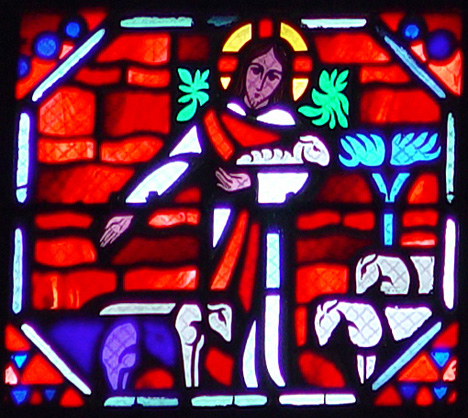
John 10:1-20
- He calls his own sheep by name and leads them out (v3)
- When he has brought out all his own, he goes on ahead of them, and his sheep follow him because they know his voice (v11)
- A willingness to lay down his life for the sheep (v11).
- Personal knowledge of the sheep (v14). I know my sheep and my sheep know me
- A missionary heart for other sheep (v16)
Psalm 23
In this passage, God is described as a shepherd who cares for his sheep. The speaker of the psalm (presumably David, the author of many of the psalms) identifies himself as a sheep who is under God’s care. Here are some of the ways in which God is depicted as a shepherd in this passage:
- God provides for his sheep’s needs (“I shall not want”), leading them to green pastures and still waters where they can find rest and refreshment.
- God guides his sheep on the right path (“he leadeth me in the paths of righteousness”), correcting and restoring them when they go astray.
- God protects his sheep from danger, even in the midst of the darkest valley (“though I walk through the valley of the shadow of death, I will fear no evil: for thou art with me”).
- God provides comfort and sustenance in times of hardship (“thy rod and thy staff they comfort me”; “thou preparest a table before me in the presence of mine enemies”).
- God promises to care for his sheep always, and to welcome them into his house (“surely goodness and mercy shall follow me all the days of my life: and I will dwell in the house of the Lord forever”).
Another passage in the Old Testament where God is depicted as a shepherd is Ezekiel 34. In this chapter, God rebukes the leaders of Israel for their failure to care for their people and promises to be a shepherd to them himself. Here are some of the ways in which God is described as a shepherd in Ezekiel 34:
- God seeks out his lost sheep, rescuing them from danger and bringing them back to safety (“I will seek that which was lost, and bring again that which was driven away”).
- God provides for his sheep’s needs, giving them food and water and protecting them from predators (“I will feed them in a good pasture, and upon the high mountains of Israel shall their fold be: there shall they lie in a good fold, and in a fat pasture shall they feed upon the mountains of Israel”).
- God cares for his sheep’s physical and emotional well-being, healing their wounds and strengthening the weak (“I will bind up that which was broken, and will strengthen that which was sick”).
- God judges between the strong and the weak, ensuring that justice is done and that the vulnerable are protected (“I will judge between cattle and cattle, and between rams and he goats”).
- God promises to be with his people always, watching over them and bringing them to a place of safety and abundance (“And I will make with them a covenant of peace, and will cause the evil beasts to cease out of the land: and they shall dwell safely in the wilderness, and sleep in the woods
